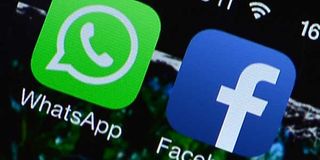Digital natives fuelling politics with tech

Facebook, Twitter, WhatsApp and other platforms are changing how politicians connect with voters. AFP| PHOTO
What you need to know:
- The mobile phone has changed not only the way people communicate but the way they lead their social, economic and political lives.
- Kenya is far ahead of other African countries when it comes to mobile phone penetration, the use of internet and social media.
When people talk about the intersection of social media and politics, the focus is usually on the ways that Facebook, Twitter, WhatsApp and other platforms are changing how politicians connect with voters.
Things are a bit different in Kenya.
The mobile phone has changed not only the way people communicate but the way they lead their social, economic and political lives.
The phone is undoubtedly one of the most important gadgets. The just concluded primaries have revealed the best of Kenyans.
Not so much about the strength of our democracy, but how good and fast our creative juices flow when we are holding a phone and thinking politics.
MESSAGES EXCHANGED HANDS
During this season, and going by the millions of messages that exchanged hands, mobile services providers must be laughing all the way to the bank.
Kenya is far ahead of other African countries when it comes to mobile phone penetration, the use of internet and social media.
Almost every Kenyan has at least one phone. Nearly 80 per cent of Kenyans access the internet and more than 5.5 million read and write the Facebook.
In other words, Kenyans have the platform to create and consume content at an unprecedented scale.
That is why, millions of Kenyans, including those living abroad, repeatedly topped up their airtime and stashed data bundles to exchange real, and concocted messages, including caricatures of situations and people vying for positions.
DEFRAUDING VOTERS
Before the mainstream media broke the news, video clips of the goings-on at the various polling and tallying centres were already doing the rounds.
Even though there was plenty of humour and propaganda that hoped from phone to phone, the near universal penetration of mobile phones ensured that anyone bent on defrauding the voters would have to think twice as none can be too sure that there is no phone camera or recorder in the vicinity.
Many such plans were quickly exposed, and effectively nipped in the bud.
WhatsApp is one of the most preferred tool for online meetings, messaging and mudslinging.
The challenge is, for many people, it is not easily possible to sniff the real from the fake information.
INACCURATE INFORMATION
Inability to tell inaccurate information is one of the challenges of the social media.
Many people often swallow the news wholesomely and generously share with friends and relatives.
In the just concluded primaries, it is not possible to tell how many voters were swayed by the constant stream of information and pictures on their phones.
One thing is for sure, no phone was immune to humour wrapped in jokes, jests and jollies.
This experience was a good warm-up for the August contest.
Unlike elections that were held a decade ago, these days, people can speak freely and inform or antagonise without batting an eye.
The phones have provided a platform for everyone to get their views known. The apps empower the population.
EMPOWER CITIZENS
Whatever a politician says is swiftly spread to thousands of phones and copies of the message curated online.
They can quickly tell how their messages resonate with the public. If it’s bad, there is no way to retract it.
In communication science, new communication technologies – in particular the internet and social media – have been referred to as “liberation technology” because of their “potential to empower citizens to confront, contain, and hold accountable authoritarian regimes — and even to liberate societies from autocracy.
Brace yourself for the explosion of the social media between now and the General Election.
There are many factors to support the current wave. One most important one is that digital natives, the most tech-savvy generation will be among the largest demography voting this time.
If used well, mobile phones and the social media can help inform the population and reinforce democracy.
The writer is an informatics specialist. [email protected]. @samwambugu2





